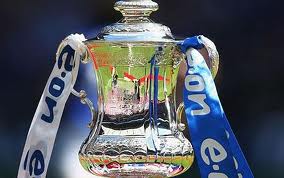The FA Cup is still a prestigious, important, high value competition, writes Steve Beauchampé. What’s not to like?
There are many responses that Aston Villa manager Paul Lambert could have given when asked by BBC Radio WM sports reporter Mark Regan about his attitude to the FA Cup. How about: “We want to win every competition we enter and that includes the FA Cup.” Or perhaps: “This club has a proud history in the competition, having won it seven times, and I’m aiming to honour that history by taking us as far as we can go. It’s our only chance of silverware left this season, so it’s a priority.” Maybe even: “A cup run can give everyone a lift, and we’d love to reward our fans’ loyalty with a day out at Wembley in May. That said, the Premier League is important so I might give one or two squad players a run out, which gives them first team action and a chance to show me what they’re capable of.”
Rational, honest answers all, displaying tact and ambition, with a small window to climb through as a get out clause in the event of ignominious defeat. But no, despite an upcoming 3rd Round tie, and surely realising that he would be asked the by now perennial question about contemporary attitudes to the FA Cup, Lambert responded that (in essence) most Premier League managers could do without the FA Cup and that points and League survival are more important. When asked what constituted success Lambert replied that in modern day football people measure success by the length of your contract and the money that you earn.
Honest and realistic comments, claimed Lambert’s supporters, and to some extent they were. Yet Lambert was clearly doing more than assessing the attitude of fellow Premier League clubs to the FA Cup and evaluating its current standing in relation to the League. He was also giving an insight into the thinking of his own club and as such his remarks display a shocking paucity of ambition at Villa Park. Cue widespread criticism by fellow coaches, many Villa fans, the media and others within the game (some rather hypocritically it should be acknowledged). The opprobrium may have been unfairly targeted, but the use by Lambert of one of the more diplomatic answers suggested in paragraph 1 above could have avoided the furore in the first place.
Of course the comments came back to bite Lambert tenfold following Villa’s home humiliation at the hands of Sheffield United, 51 places below them in the professional league pyramid. Thus Villa fans can now look forward to four months of scratching around in the bottom half of the table, another trophy-less season and the spectre of watching other Premier League also-rans, such as League Cup holders and Europa League participants Swansea City, make the headlines for all the right reasons (their victory at Old Trafford accompanied by wise and considered words from coach Michael Laudrup, recognising and contextualising his side’s achievement and what it meant for their supporters). Under the circumstances neither Lambert, nor Aston Villa’s owners, can blame those Villa fans if they stayed away until next August and beyond.
Of course this is by no means the first occasion in which the FA Cup’s once seemingly impeachable reputation has been tarnished. Most top flight clubs (especially the Champions League set) field weakened teams, sometimes until the Quarter Final stage, and low crowds in the 3rd, 4th and even 5th rounds have been the norm for over a decade. Indeed, the Football Association itself has done more than anyone to debase the Cup, from constantly altering the time of the draw, famously offering Manchester United an opt out, playing the semi finals at Wembley (thus subtracting greatly from the allure of reaching the Final), to playing the Final at any time other than 3pm on a Saturday as a stand alone fixture.
At least the leading clubs could claim that they had around a dozen Champions League fixtures to play. Aston Villa had no such excuse. Football’s money-laden gravy train has long since left the station and Villa weren’t on it, while once comparably sized clubs such as Manchester City, Spurs and, arguably, Everton are. As the biggest club in this region and with such an illustrious history, this situation is unpalatable to both Villa’s followers and those who would wish to use footballing success as a means of promoting the city. Yet for all their mediocre long-term prospects and the ever-increasing gap between Villa and the Champions League contenders, as supporters of middle and lower-ranking Premier League sides have increasingly realised, the FA Cup and League Cup are achievable goals and trophies to be valued, providing memories (and medals) that last a lifetime. Sure, Birmingham City and Wigan Athletics’ recent cup triumphs were closely followed by relegation, but while Villa are inconsistent, they aren’t desperately bad and there’ll likely always be at least three worse sides in the Premier League to ensure the club retains its constant top flight status (well, I think so anyway).
For now though Paul Lambert and his players may like to hold off on that open top bus parade until they’ve got more than contract extensions and large pay cheques to wave at their supporters.
